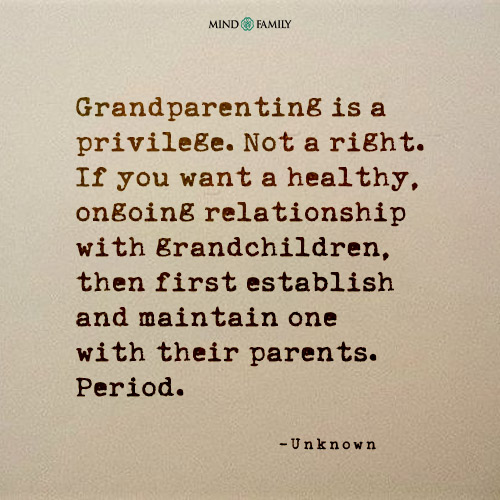Have you ever noticed certain behaviors that make you wonder if your grandparents’ love might be a little… off? Spotting the signs of toxic grandparents can be tough, especially when society paints them as the ultimate source of unconditional love and support.
But sometimes, grandparents might cross boundaries, show favoritism, or create a stressful environment that doesn’t quite feel right. If you’ve ever felt uneasy about their behavior, you’re not alone.
In this article, we’ll dive into the subtle and not-so-subtle signs of toxic grandparents and give you some strategies regarding how to deal with toxic grandparents, without causing family drama.
First, let us try to understand what are toxic grandparents.
Related: 8 Warning Signs Of A Toxic Grandparent
What Are Toxic Grandparents?
Toxic grandparents are those who, instead of being a positive, loving influence, stir up tension and stress in the family. They might ignore parents’ rules, play favorites with the grandkids, or use guilt trips to get their way.
Instead of supporting the family, manipulative toxic grandparents end up creating drama, making others feel uncomfortable or insecure. Maybe they’re overly critical, meddling, or just have to be the center of attention all the time.
These behaviors can strain family relationships and make things feel complicated. Recognizing this can help you and your family set limits that keep everyone feeling safe and respected.
Now that we know what are toxic grandparents, let’s talk about the signs of toxic grandparents.
8 Signs Of Toxic Grandparents
1. Constantly Overstepping Parental Boundaries
One of the major signs of toxic grandparents is when they feel entitled to disregard the rules parents set for their kids. They may think they know better or feel their ways are “tried and true.”
This can mean overriding decisions on food, sleep, discipline, or anything else they disagree with. While occasional advice is great, toxic grandparents cross lines that create confusion for the kids and stress for the parents.

2. Playing Favorites Among Grandkids
Favoritism can be a heartbreaking sign of toxicity in grandparents. They might openly favor one grandchild over others based on looks, achievements, or behavior. This hurts not just the overlooked grandkids but also causes friction among siblings.
Over time, this favoritism can lead to a lot of resentment and self-esteem issues, especially if one child feels like they can never measure up.
3. Using Emotional Manipulation
If a grandparent uses guilt to get their way, that’s emotional manipulation at play. Manipulative toxic grandparents might say things like, “After all I’ve done for you,” or “I might not be here much longer.”
Such tactics are designed to make others feel bad and comply with their demands. It’s a subtle yet powerful form of control that leaves others feeling obligated and often unhappy.
4. Disregarding Your Parenting Choices
Living with toxic grandparents might mean that they will belittle or ignore the way you choose to raise your kids. From your choice of diet to disciplinary methods, they might openly criticize or make you feel inadequate.
If they’re undermining your decisions as a parent, it’s a clear sign they don’t respect your authority, and it can cause tension between you and your children. Cutting off toxic grandparents might be a good idea in situations like this.
5. Gossiping or Bad-Mouthing Behind Your Back
Hearing from others that a grandparent has been talking negatively about you or your parenting is painful and unfair. Toxic grandparents may feel the need to vent or criticize behind your back, creating family tension and damaging trust.
This behavior can put you in a defensive position and lead to misunderstandings within the family.
Related: How To Deal With Toxic Relatives: 6 Effective Tips To Follow!
6. Demanding Time and Attention Relentlessly
One of the biggest signs of toxic grandparents is this. Constantly expecting visits, calls, and attention without regard for your schedule or life is a red flag.
Toxic grandparents often try to monopolize your time or make you feel guilty if you don’t meet their demands. This behavior ignores your need for balance and self-care, piling on stress and resentment over time.
7. Overly Involved in Family Conflicts
Inserting themselves into every disagreement, manipulative toxic grandparents might try to play mediator or even instigator. This creates even more friction and can make it difficult for other family members to resolve their issues independently.
When grandparents take sides, it creates a divisive environment that affects the entire family dynamic.
8. Criticizing or Comparing Grandchildren
When grandparents constantly criticize or compare one grandchild with another or with other kids, it can leave lasting emotional scars. Toxic grandparents might make children feel inadequate by nitpicking about their appearance, behavior, or achievements.
This not only affects kids’ confidence but can also lead to strained relationships within the family.

Now that we know the signs of toxic grandparents, let’s talk about how to deal with toxic grandparents.
How to Deal With Toxic Grandparents
1. Shift Conversations Toward Positivity
When a toxic grandparent starts criticizing or manipulating, redirect the conversation toward something positive. Compliment them on something they enjoy or find neutral topics they like talking about.
This can help derail negativity and reduce the chance of heated discussions. By subtly controlling the conversation, you keep things peaceful while setting a positive tone.
2. Use “Gray Rock” Communication
How to deal with toxic grandparents? “Gray rocking” is a technique where you act as uninteresting as possible to discourage negative behavior. If a grandparent begins to pry or manipulate, respond with short, bland answers that don’t fuel the conversation.
This takes the fun out of stirring the pot and may lead them to drop the topic. Over time, they’ll learn that certain behaviors won’t get a reaction.
3. Involve a Third Party for Clarity
If issues with toxic grandparents escalate, sometimes a neutral family member can help clear the air. Having a third person listen and mediate can help them see how their actions are impacting the family.
Make sure it’s someone who understands your point of view and can keep things civil.
4. Create “Safe” Events and Boundaries Together
If you are thinking about how to deal with toxic grandparents, then plan specific gatherings that offer limited interaction opportunities. For example, suggest family activities where everyone’s engaged, like movie nights or game days.
These environments prevent one-on-one opportunities for manipulation or favoritism, giving you control over how much interaction everyone has.
Related: 5 Bulletproof Tips For Dealing With Toxic Family Members
5. Set Personal Boundaries Through Actions, Not Words
If talking about boundaries doesn’t work, try to enforce them with actions instead. If they criticize your parenting, for example, calmly excuse yourself from the conversation or leave the room.
Over time, your actions will show them what’s acceptable and what isn’t. It’s a passive but effective way of setting boundaries without direct confrontation.
6. Give Kids Age-Appropriate Tools to Handle Behavior
If your children are old enough to notice and be affected by toxic behaviors, teach them subtle ways to manage.
Role-play scenarios or explain that it’s okay to respectfully stand up for themselves or walk away when things get uncomfortable. Helping your kids feel empowered makes them less vulnerable to negative influences.
Dealing with toxic grandparents can be tricky and emotionally draining, especially when they hold a close bond with your kids. But with the right strategies, you can keep their influence in check while still maintaining some peace in the family.
Do you have experience living with toxic grandparents? What are your thoughts on cutting off toxic grandparents? Let us know in the comments down below!











Leave a Reply